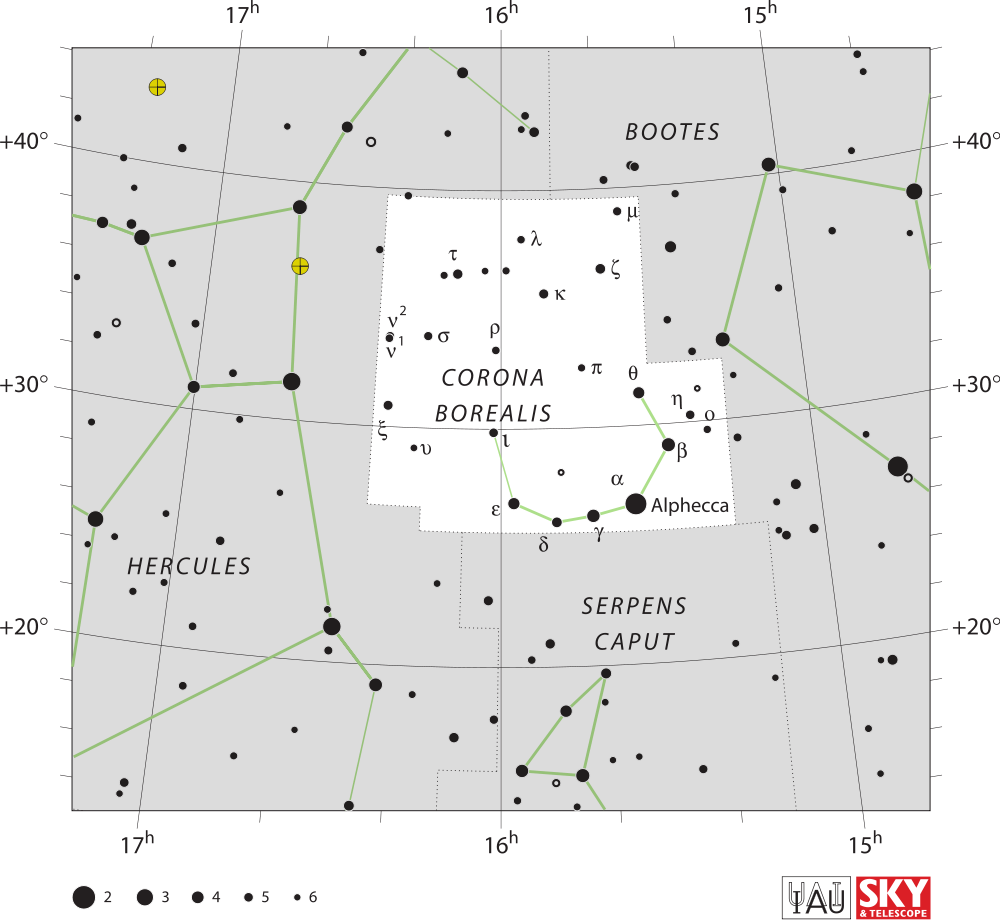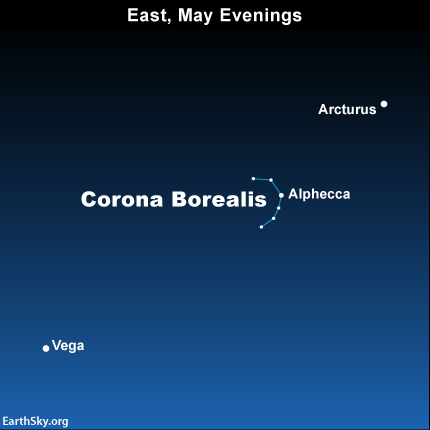Tonight, look for a constellation that’s easy to see on the sky’s dome, if your sky is dark enough. Corona Borealis – aka the Northern Crown – is exciting to find. It’s an almost-perfect semi-circle of stars. You’ll find this beautiful pattern in the evening sky from now until October.
The constellation Corona Borealis is located more or less along a line between two bright stars, Arcturus in the constellation Bootes the Herdsman and Vega in the constellation Lyra the Harp.
At nightfall and early evening, you’ll see Arcturus fairly high in the east to northeast, noticeable for its brightness and yellow-orange color. Vega will be rather low in northeast – bright and blue-white in color. The Northern Crown is more or less between these two bright stars. It’s a semi-circle of stars – very noticeable in a dark sky.
The brightest star in Corona Borealis is Alphecca, also known as Gemma, sometimes called the Pearl of the Crown. The name Alphecca originated with a description of Corona Borealis as the “broken one,” in reference to the fact that these stars appear in a semi-circle, rather than a full circle. Alphecca is a blue-white star, with an intrinsic luminosity some 60 times that of our sun. It’s located about 75 light-years from Earth.

The C-shaped constellation Corona Borealis shines between the constellations Bootes and Hercules. Constellation chart via IAU.
Corona Borealis, the Northern Crown, as pointed out with a green laser pointer by Jan Wojcik, director of Reynolds Observatory. Image Credit: Kyle Foley
Bottom line: Look for Corona Borealis – the Northern Crown – between the brilliant stars Arcturus and Vega tonight! This constellation is very noticeable, if you have a dark sky.
EarthSky astronomy kits are perfect for beginners. Order today from the EarthSky store
Donate: Your support means the world to us
from EarthSky https://ift.tt/1HhcwQE
Tonight, look for a constellation that’s easy to see on the sky’s dome, if your sky is dark enough. Corona Borealis – aka the Northern Crown – is exciting to find. It’s an almost-perfect semi-circle of stars. You’ll find this beautiful pattern in the evening sky from now until October.
The constellation Corona Borealis is located more or less along a line between two bright stars, Arcturus in the constellation Bootes the Herdsman and Vega in the constellation Lyra the Harp.
At nightfall and early evening, you’ll see Arcturus fairly high in the east to northeast, noticeable for its brightness and yellow-orange color. Vega will be rather low in northeast – bright and blue-white in color. The Northern Crown is more or less between these two bright stars. It’s a semi-circle of stars – very noticeable in a dark sky.
The brightest star in Corona Borealis is Alphecca, also known as Gemma, sometimes called the Pearl of the Crown. The name Alphecca originated with a description of Corona Borealis as the “broken one,” in reference to the fact that these stars appear in a semi-circle, rather than a full circle. Alphecca is a blue-white star, with an intrinsic luminosity some 60 times that of our sun. It’s located about 75 light-years from Earth.

The C-shaped constellation Corona Borealis shines between the constellations Bootes and Hercules. Constellation chart via IAU.
Corona Borealis, the Northern Crown, as pointed out with a green laser pointer by Jan Wojcik, director of Reynolds Observatory. Image Credit: Kyle Foley
Bottom line: Look for Corona Borealis – the Northern Crown – between the brilliant stars Arcturus and Vega tonight! This constellation is very noticeable, if you have a dark sky.
EarthSky astronomy kits are perfect for beginners. Order today from the EarthSky store
Donate: Your support means the world to us
from EarthSky https://ift.tt/1HhcwQE


Aucun commentaire:
Enregistrer un commentaire